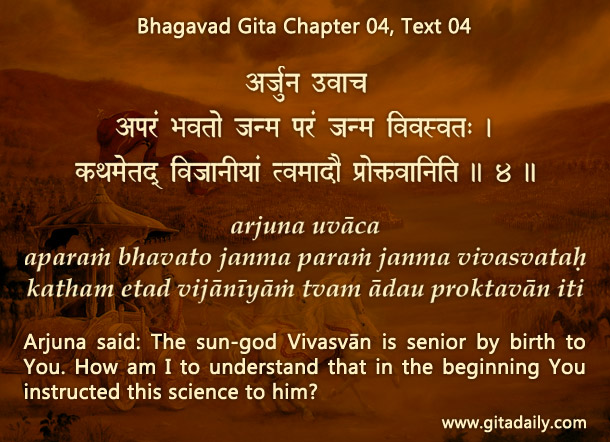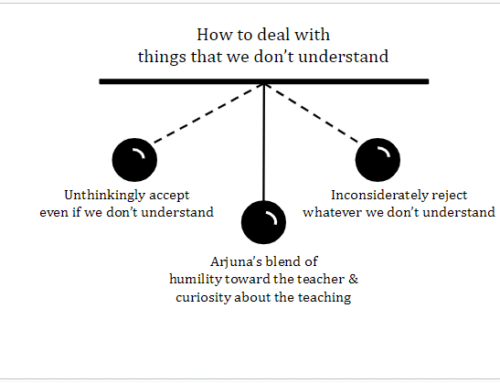How could past people believe in things we find irrational? – Some people argue, “Past people who believed ancient texts were irrational — that’s why they accepted various fantastic elements found in those texts.”
Consider the Bhagavad-gita, which is the philosophical heart of the ancient Indian epic Mahabharata. Therein, the speaker Krishna states that he taught spiritual wisdom at the dawn of creation (04.01). This assertion raises the obvious question: How could Krishna have taught anything so long ago when he is clearly not that old? Significantly, the Gita’s original student, Arjuna, asks that same question (04.04). Neither is he uncritical in accepting that claim, nor does Krishna consider him insubordinate in questioning it.
Without skipping a beat, Krishna replies that they both have had many past lives (04.05) and he remembers all of them because he is the Supreme (04.06) who descends periodically to raise human consciousness (04.07-09).
What does this conversation signify? That people in the past were open to a more expansive kind of rationality wherein they accepted as reasonable explanations that we consider outside our conception of rationality. Their expansive rationality arose from a holistic vision of the universe, whereby they saw it as more than a materialistic arena for the motion of insentient particles according to impersonal laws. They saw the universe as containing both material and spiritual elements; it was therefore the arena for conscious beings with powers far greater than ours; their powers made them capable of doing things we can’t.
Rather than assuming that we are irrational and the epics are irrational, maybe we can consider that the underlying worldview of the epics presents a rational case for freeing rationality from the limits we have placed around it. Such an expansive rationality may better explain our conscious experiences, equipping us to live more meaningfully.
One-sentence summary:
The Bhagavad-gita isn’t irrational; it exhibits a rationality more expansive than our present matter-bound version of rationality.
Think it over:
- Were people who accepted ancient texts irrational?
- How does the Gita demonstrate rational enquiry?
- What is the rational case for expanding our conception of rationality?
***
04.04: Arjuna said: The sun-god Vivasvan is senior by birth to You. How am I to understand that in the beginning You instructed this science to him?



Leave A Comment